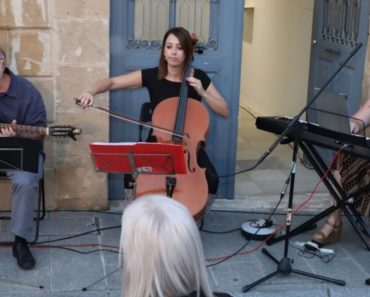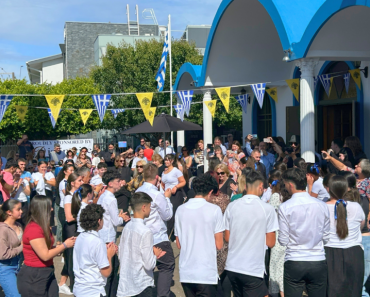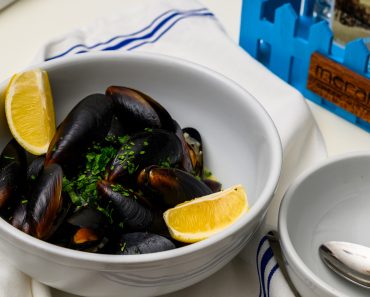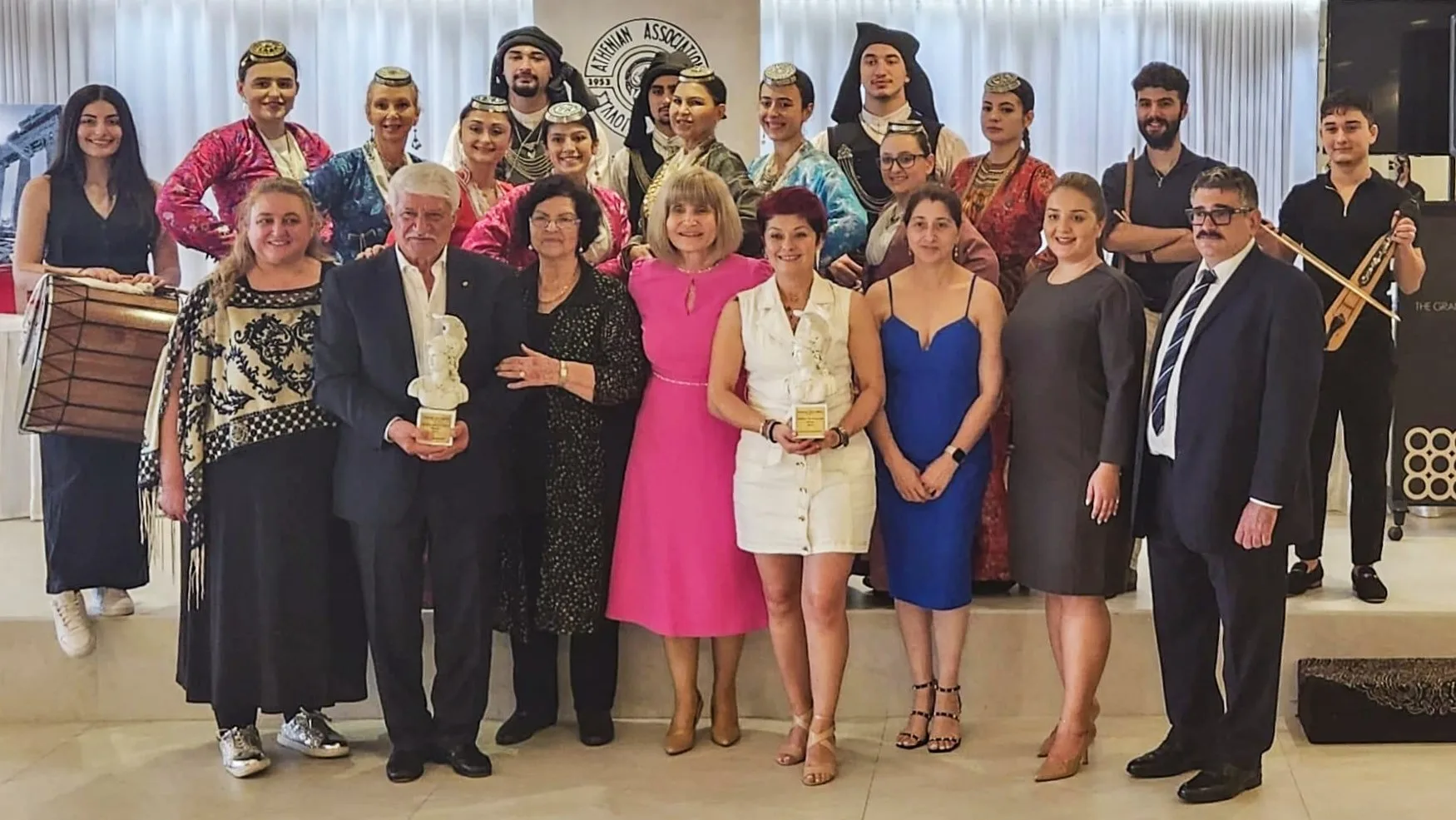In a historic building in downtown Cairo, among the Greek-style buildings built by the Greeks long ago, with their blue and white painted windows, lies the Greek Club of Cairo, which serves as a social and entertainment club and restaurant. In an outdoor hall, a sign reads “Hellas” and an entrance with the flags of Egypt and Greece in the middle. You can take a quick trip to Athens from within Cairo. If you miss Athens, the Greek Club of Cairo may have you covered. There, you will feel that Cairo and Athens are closer than you think, and that the Greeks and Egyptians are closer than you think.
From Cairo to Athens
In the winter of 2021, my trip to Greece was disrupted by the Covid lockdown measures, and on a cloudy, rainy day, I discovered the Greek Club in Cairo by chance – I had heard a lot about it but had never visited – I found it on Google with high ratings. In a huge building with a white and blue entrance on Mahmoud Bassiouni Street overlooking downtown Talaat Harb Square, there is the Greek Club in Cairo, which was established in 1893. Later I learned that the owner of the building is Greek, like the surrounding buildings!
On my first visit to the Greek Club, I did not understand how much it resembled Athens, but after my first visit to Greece in November 2022, and my tours in the Plaka and Anafiotika areas, I learned that the Greek Club carries more details of Athens than any other place in Egypt, and it has become my favorite place between each trip to Athens when I miss it! At the entrance to the club you will find a marble sign that reviews the history of the club and its presidents throughout history, starting with “Essinabo Postes,” the first president of the club from 1893 to 1908, ending with the current president, Nicola.
In the corridor leading to the outer hall, you will find two statues dressed in classical Greek clothing, like soldiers performing the famous changing of the guard ceremony in front of the Greek Parliament in Syntagma Square! The tables are small and covered with blue and white tablecloths, similar to the restaurants in Plaka. The menu is delicious Greek food, as if it had just been cooked in Athens. Classical and modern Greek songs serve as a musical backdrop, remeniscent of the streets of Psyrri and Aiolou!
Regarding the similarity between the Greek Club and Athens, the director of the Greek Club, Sameh Bashandi, commented to Kathimerini: “This is due to the nature of the place that combines Greek decor and the antiquity of ancient Egypt, and also due to the comfort and privacy that characterizes the Greek Club. There are also old workers who were raised by Greek boards of directors, and one of the conditions for assuming their position is proficiency in the Arabic language, which allowed them to communicate effectively with the Egyptian workers and educate them in Greek culture, which led to the place reaching a high degree of similarity to a Greek atmosphere. The club will also open another branch in the city of Dahab in South Sinai, overlooking the Red Sea, and it will be similar to Greek islands such as Santorini. In this context, Sameh (the receptionist at the Greek Club) added to Kathimerini: “There are some features that made the Greek Club resemble Greece, the blue and white colors, and the Greek music, make you feel like you are in a restaurant on one of the Greek islands, in addition to the Greek menu, all of this makes you feel like you are in Greece, the only thing missing is the sea.” The club also has an air-conditioned indoor area that resembles the ancient Egyptian royal palaces in the decor and Egyptian colors that have been constant throughout the ages,” Sameh added.
Regarding Greek food and the menu that includes “souvlaki, tzatziki, kofta, and Greek salad,” I asked Sayed, the head of the Greek Club, “How did you get the Greek flavor through an Egyptian chef?” Sayed answered, “The management constantly gives us instructions to develop the kitchen.” Laughing, he added, “We are similar to each other and learn from each other.”

History of the Greek Club
The Greek Club in Cairo was founded in 1893, and a royal decree was issued by King Constantine to make the Greek Club an official club in 1896. It was initially founded as a club for Greeks residing in Cairo only, but it opened its doors to everyone after the 1952 revolution. The Greek George Roupapis was the first to assume the chairmanship of its board of directors, as the club was founded to serve the Greek community in Egypt and provide educational and recreational services and increase the ties between them. The place is considered one of the “archaeological sites” because it was founded more than a hundred years ago, and many celebrities have visited it in the past and right up to today, and now the place is frequented by many foreign communities and some writers, intellectuals, artists and journalists.
The vice president of the Greek Club of Cairo, Antonis Kazamias, told Kathimerini that “the Greek Club is one of the oldest associations of the Greek community in the Egyptian capital. It is supervised by the Egyptian Ministry of Social Solidarity and is governed by a board of directors of members (mainly Greeks) and a board of directors elected by the general assembly. The chairmen of the board are Greeks who were born in Egypt, but we have a constant connection with Greece, Greek traditions, Greek cuisine etc. Egypt is our second country and welcomes us. So it is not just a similarity – it is Greek as in Greece.”

Endless similarities
Egypt has been a destination for many different religions and nationalities throughout the ages, including the Greeks, a community that has been famous for its large presence in Egypt during the last century.
You don’t need to be an explorer to understand that Greece has a strong presence in Egypt, as many buildings, streets and restaurants carry Greek culture, and merge with Egyptian culture to a degree that is sometimes difficult to separate, and even if the number of the Greek community in Egypt has now dropped to a few thousand, the influence of Greek culture is clear.
Not just the monuments and buildings, but also the “features.” I learned that the Greeks and Egyptians have a lot in common, some describe them as Middle Eastern characteristics, and I believe that they are deeper than that, starting with the lifestyle, as the Greeks and Egyptians stay up late at night, and love food and life, and it extends to pride in their identity and respect for their distinctive history, all the way to the warmth, friendliness and smiles on faces that you can hardly find anywhere else.
Sayed commented to Kathimerini: “I have been working here for 27 years, and I would like to praise the Greeks’ treatment of us in the place because they do not consider themselves strangers to Egypt, in addition to the compatibility of some of their behaviors and natures with the nature of the Egyptians.”
In the same context, the receptionist Sameh commented: “From my personal experience with Greeks, they are the people most similar to the Egyptians in terms of dealing, love and hospitality, and they appreciate these qualities, and they love to be Egyptians, and they love to be Egyptians, and perhaps because of their long presence in Egypt, everything was affected from us to each other.”
Kazamias added that the Greek Club, “like all Greek associations and the Greek community, has a very good connection with the Egyptians. The Greeks have been here in Egypt for more than a century. The Greek Club is located in a unique place in the heart of historic Cairo and has always been open to Egyptians as well as Greeks and other nationalities. This is the last cosmopolitan place in Cairo, and thus it has become the bridge between the Greeks and Greece, Greek traditions, history, cuisine and culture, and between the Egyptians and the Egyptian culture. This is a unique friendship between these Greek and Egyptian people.”

Through my many visits to the Greek Club and my interactions with visitors, I learned that the Greek Club is not only a destination for Greeks residing in Egypt, who want a place that makes them feel like they are in their motherland, nor for passers-by who plan to visit Athens and want a glimpse of Greek culture. I discovered that the place has succeeded in being a destination for Greeks who come to Egypt as tourists. Spiros, my Greek friend who visited Cairo as a tourist, says: “I was in downtown Cairo and found an entrance that seemed to be a restaurant on the top floor, so I went up and discovered that it was the Greek Club. I felt the warmth, nostalgia and the atmosphere of Athens.” Then he laughed, “We Greeks find each other easily.”
Regarding the visitors to the Greek Club, Sayed told Kathimerini: “Visitors to the Greek Club are from all nationalities of the world: Egyptians, Arabs and Greeks. There are those who have traveled outside Egypt for years and then returned to the Greek Club because of their connection to it, and perhaps because the character of the place has not changed. We preserve its Greek identity, and we want to make it the place where you return to find your memories as they are.”
In Athens, I met George, my Greek friend who stayed in Egypt for several months, and I asked him, “Do you miss Cairo?” He replied: “Yes, I really want to go back to Zamalek, the streets of Cairo and the Greek Club!” He used to go there a lot when he missed Athens. And, no! He missed Cairo!
Sara Sherif is a journalist and foreign affairs analyst.







